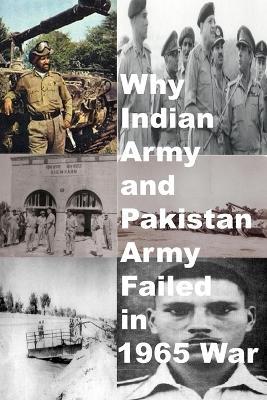Why Indian Army and Pakistan Army Failed in 1965 War

Why Indian Army and Pakistan Army Failed in 1965 War
ForewordMajor (retd) Agha Humayun Amin is a rare type of army officer. He is a philosopher, debater and a very keen scholar of military affairs. His writings are prolific. He does not hesitate to call into question received wisdom and dares to explode sacred myths behind which military establishments generally hide their blunders and failures. I have benefited a great deal from his scholarly contribution on the Pakistan Army and have cited and quoted him in my book, Pakistan: The Garrison State - Origins, Evolution, Consequences (1947-2011). I particularly found his work very useful to understand the Kashmir War of 1947-48 and the 1965 war. I am therefore truly privileged to note that he has now presented a detailed analysis of the 1965 War in which he explains the reasons why neither India nor Pakistan made much headway in that conflict that lasted 17 days (6 - 23 September 1965). He writes with clarity not mincing words and therefore it is easy even for the general reader to follow his reasoning. However, he writes with an authority that comes only through a long and dedicated commitment to understanding the nature and purpose of war, the sociological and psychological underpinnings of warfare, the quality and competence needed to establish credible armed forces and above all the role and purpose of training for warfare. His knowledge is encyclopedic with regard to military philosophy. Since I have no background in military science or the art of modern warfare I am in no position to comment with authority on his evaluations of the reasons why the 1965 War ended in a stalemate. However, there is no doubt that he brings to bear his vast erudition on his analysis with great skill and persuasion. The roots of the problem are traced to the origins of the British Indian Army from whom both the Indian and Pakistani armies descend. The author argues that the Indians - Hindus, Muslims and Sikhs were recruited into that army essentially with the purpose of maintaining the status quo in the volatile tribal areas. They were never trained to be modern armies capable of independent responsibility to fight national wars. Famously, the British put little trust in the Indians with regard to leadership roles. Even when entry to the officer class or commissioned officers was granted to the Indians in 1919 they were not promoted to command positions beyond the rank of colonels. There were hardly one or two brigadiers when British rule ended in mid-August 1947. Amin asse
PRP: 697.42 Lei
Acesta este Pretul Recomandat de Producator. Pretul de vanzare al produsului este afisat mai jos.
627.68Lei
627.68Lei
697.42 LeiIndisponibil
Descrierea produsului
ForewordMajor (retd) Agha Humayun Amin is a rare type of army officer. He is a philosopher, debater and a very keen scholar of military affairs. His writings are prolific. He does not hesitate to call into question received wisdom and dares to explode sacred myths behind which military establishments generally hide their blunders and failures. I have benefited a great deal from his scholarly contribution on the Pakistan Army and have cited and quoted him in my book, Pakistan: The Garrison State - Origins, Evolution, Consequences (1947-2011). I particularly found his work very useful to understand the Kashmir War of 1947-48 and the 1965 war. I am therefore truly privileged to note that he has now presented a detailed analysis of the 1965 War in which he explains the reasons why neither India nor Pakistan made much headway in that conflict that lasted 17 days (6 - 23 September 1965). He writes with clarity not mincing words and therefore it is easy even for the general reader to follow his reasoning. However, he writes with an authority that comes only through a long and dedicated commitment to understanding the nature and purpose of war, the sociological and psychological underpinnings of warfare, the quality and competence needed to establish credible armed forces and above all the role and purpose of training for warfare. His knowledge is encyclopedic with regard to military philosophy. Since I have no background in military science or the art of modern warfare I am in no position to comment with authority on his evaluations of the reasons why the 1965 War ended in a stalemate. However, there is no doubt that he brings to bear his vast erudition on his analysis with great skill and persuasion. The roots of the problem are traced to the origins of the British Indian Army from whom both the Indian and Pakistani armies descend. The author argues that the Indians - Hindus, Muslims and Sikhs were recruited into that army essentially with the purpose of maintaining the status quo in the volatile tribal areas. They were never trained to be modern armies capable of independent responsibility to fight national wars. Famously, the British put little trust in the Indians with regard to leadership roles. Even when entry to the officer class or commissioned officers was granted to the Indians in 1919 they were not promoted to command positions beyond the rank of colonels. There were hardly one or two brigadiers when British rule ended in mid-August 1947. Amin asse
Detaliile produsului








